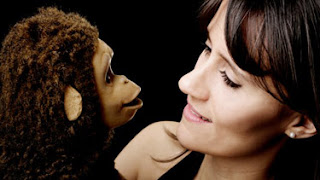Tuesday, April 2, 2013
The Cinema File #151: "Her Master's Voice" Review
Clocking in at just under an hour, Her Master’s Voice is easily the shortest movie I’ve ever reviewed for this website. Just as I’m wondering whether the running time disqualifies it as a movie subject to review, I find that the film is suffering its own identity crisis, fully aware of the fact that it straddles the line between documentary, mockumentary, and some weirdly schizophrenic video diary experiment. Compounding that disorienting set up, the movie itself is about a topic near and dear to my heart, the inner life of puppets and the clearly somewhat insane people who tear off a piece of their own psyche to imbue these inanimate homunculi with some semblance of pseudo-life. I expected to enjoy this movie just based on my own preoccupation with puppetry, but I didn’t expect to be as moved by it as I ultimately was.
The film follows its director and writer Nina Conti, a surprisingly young woman considering how accomplished she is in the art and industry of professional ventriloquism, who travels from Britain to Kentucky on a quest to honor the memory of her deceased mentor in what is apparently the ventriloquist capital of the world. That there are still enough ventriloquists around to justify a ventriloquism capital of the world is only one of the surprises in this movie, which pales in comparison to just how easy it is to become emotionally invested in a film co-narrated by a nebbishy fake monkey puppet. Said puppet acts as the vessel through which Conti pours all of her eccentricities and insecurities in such a way as to cause one to question how much control she has over what her thrown voice chooses to say, a situation that gets even more complicated when one puppet becomes five.
Conti has inherited a small collection of ventriloquist dummies from her former teacher, including one that strangely enough seems to be patterned after the man himself, and at the outset of her adventure intends to donate one or more of these lonely voiceless beings to Vent Haven, the world's largest puppet museum, which has become a traditional final resting place for the dummies left behind by their dead owners. She plans her trip to coincide with a local annual convention, where she can ply her craft, meet her contemporaries, and ultimately decide for herself whether a life and a career as a stage puppeteer is one that she wants to continue. Along the way, she channels her grief and disorientation at the loss of her creative anchor through her attempts to find the voices of her new puppets, each one developing a different personality reflecting a different part of Conti as she deals with everything going on in her life.
If only for the chance to peek into this bizarre world of oddball performers, Her Master's Voice is a must see just as a curiosity. To a person, these ventriloquists who commit so fervently to honing their skills seem to delight in the obscurity of their art. They speak of overcoming shyness through the intermediary of an alternate persona, blossoming from introvert to extrovert via their puppets' ability to do and say what they can't, or couldn't until something so unique served to give them confidence. And some of the feats these people perform put the old drinking trick to shame. A voice throwing expert deconstructs the art of misdirection, a man with oversized chop sticks turns a mostly immobile puppet into a fully articulated creature, and another somehow moves his lips in such a way as to look like he's talking, while his voice says something completely different, like something out of a badly dubbed Hong Kong action movie.
Still, the heart of the film is with Conti herself, and its a big one. Though there are some allusions to a sexual relationship between her and her mentor suggesting more lurid potential, Her Master's Voice is by and large a somber, reflective, and ultimately hopeful examination of how humanity can be found and reaffirmed through our interactions with the inhuman. The film makes an explicit connection between our capacity to create life biologically with our ability to create the semblance of life intellectually and creatively, likening the latter to a form of benign or even positive insanity. Call me crazy, but I found the whole affair to be a wonderful sit, and I highly recommend it.
Labels:
Movies,
The Cinema File
Subscribe to:
Post Comments (Atom)






No comments:
Post a Comment